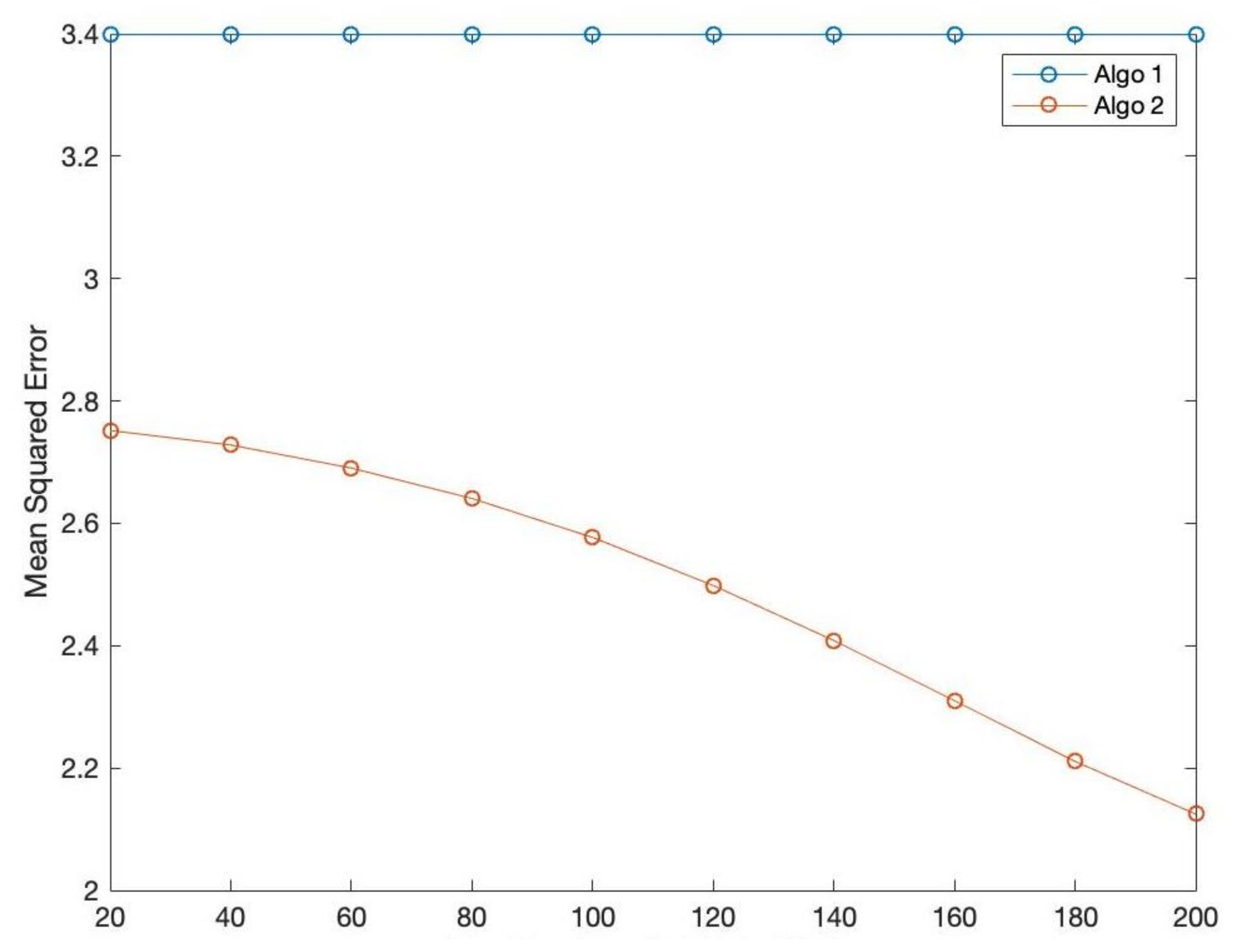Huber Regression Analysis with a Semi-Supervised Method
Abstract
:1. Introduction
2. Assumptions and Main Results
2.1. Convergence in the Supervised Learning
2.2. Convergence in the Semi-Supervised Learning
3. Proofs
3.1. Useful Estimates
3.2. Error Decomposition
3.3. Deriving Main Results
4. Numerical Simulation
5. Discussion
Author Contributions
Funding
Conflicts of Interest
References
- Huber, P.J. Robust Estimation of a Location Parameter. Ann. Math. Stat. 1964, 35, 73–101. [Google Scholar] [CrossRef]
- Huber, P.J. Robust Regression: Asymptotics, Conjectures and Monte Carlo. Ann. Stat. 1973, 1, 799–821. [Google Scholar]
- Christmann, A.; Steinwart, I. Consistency and robustness of kernel based regression. Bernoulli 2007, 13, 799–819. [Google Scholar] [CrossRef] [Green Version]
- Fan, J.; Li, Q.; Wang, Y. Estimation of high dimensional mean regression in the absence of symmetry and light tail assumptions. J. R. Stat. Soc. 2017, 79, 247–265. [Google Scholar] [CrossRef] [Green Version]
- Feng, Y.; Wu, Q. A statistical learning assessment of Huber regression. J. Approx. Theory 2022, 273, 105660. [Google Scholar] [CrossRef]
- Loh, P.L. Statistical consistency and asymptotic normality for high-dimensional robust M-estimators. Statistics 2015, 45, 866–896. [Google Scholar] [CrossRef] [Green Version]
- Rao, B. Asymptotic behavior of M-estimators for the linear model with dependent errors. Bull. Inst. Math. Acad. Sin. 1981, 9, 367–375. [Google Scholar]
- Sun, Q.; Zhou, W.; Fan, J. Adaptive Huber Regression. J. Am. Stat. Assoc. 2017, 115, 254–265. [Google Scholar] [CrossRef] [Green Version]
- Wang, Z.; Liu, H.; Zhang, T. Optimal computational and statistical rates of convergence for sparse nonconvex learning problems. Ann. Stat. 2013, 42, 2164–2201. [Google Scholar] [CrossRef] [PubMed] [Green Version]
- Chapelle, O.; Schölkopf, B.; Zien, A. Semi-Supervised Learning; MIT Press: Cambridge, MA, USA, 2006. [Google Scholar]
- Belkin, M.; Niyogi, P. Semi-Supervised Learning on Riemannian Manifolds. Mach. Learn. 2004, 56, 209–239. [Google Scholar] [CrossRef]
- Blum, A.; Mitchell, T. Combining Labeled and Unlabeled Data with Co-Training. In Proceedings of the 11th Annual Conference on Computational Learning Theory, Madison, WI, USA, 24–26 July 1998. [Google Scholar]
- Wang, J.; Jebara, T.; Chang, S.F. Semi-Supervised Learning Using Greedy Max-Cut. J. Mach. Learn. Res. 2013, 14, 771–800. [Google Scholar]
- Andrea Caponnetto, Y.Y. Cross-validation based adaptation for regularization operators in learning theory. Anal. Appl. 2010, 8, 161–183. [Google Scholar] [CrossRef]
- Guo, X.; Hu, T.; Wu, Q. Distributed Minimum Error Entropy Algorithms. J. Mach. Learn. Res. 2020, 21, 1–31. [Google Scholar]
- Hu, T.; Fan, J.; Xiang, D.H. Convergence Analysis of Distributed Multi-Penalty Regularized Pairwise Learning. Anal. Appl. 2019, 18, 109–127. [Google Scholar] [CrossRef]
- Lin, S.B.; Guo, X.; Zhou, D.X. Distributed Learning with Regularized Least Squares. J. Mach. Learn. Res. 2016, 18, 3202–3232. [Google Scholar]
- Lin, S.B.; Zhou, D.X. Distributed Kernel-Based Gradient Descent Algorithms. Constr. Approx. 2018, 47, 249–276. [Google Scholar] [CrossRef]
- Aronszajn, N. Theory of reproducing kernels. Trans. Am. Math. Soc. 1950, 686, 337–404. [Google Scholar] [CrossRef]
- Smale, S.; Zhou, D.X. Learning Theory Estimates via Integral Operators and Their Approximations. Constr. Approx. 2007, 26, 153–172. [Google Scholar] [CrossRef] [Green Version]
- Cucker, F.; Ding, X.Z. Learning Theory: An Approximation Theory Viewpoint; Cambridge University Press: Cambridge, MA, USA, 2007. [Google Scholar]
- Bauer, F.; Pereverzev, S.; Rosasco, L. On regularization algorithms in learning theory. J. Complex. 2007, 23, 52–72. [Google Scholar] [CrossRef] [Green Version]
- Caponnetto, A.; Vito, E.D. Optimal Rates for the Regularized Least-Squares Algorithm. Found. Comput. Math. 2007, 7, 331–368. [Google Scholar] [CrossRef]
- Tong, Z. Effective Dimension and Generalization of Kernel Learning. In Proceedings of the Advances in Neural Information Processing Systems 15, NIPS 2002, Vancouver, BC, Canada, 9–14 December 2002. [Google Scholar]
- Neeman, M.J. Regularization in kernel learning. Ann. Stat. 2010, 38, 526–565. [Google Scholar]
- Raskutti, G.; Wainwright, M.J.; Yu, B. Early stopping and non-parametric regression. J. Mach. Learn. Res. 2014, 15, 335–366. [Google Scholar]
- Wang, C.; Hu, T. Online minimum error entropy algorithm with unbounded sampling. Anal. Appl. 2019, 17, 293–322. [Google Scholar] [CrossRef]

Publisher’s Note: MDPI stays neutral with regard to jurisdictional claims in published maps and institutional affiliations. |
© 2022 by the authors. Licensee MDPI, Basel, Switzerland. This article is an open access article distributed under the terms and conditions of the Creative Commons Attribution (CC BY) license (https://creativecommons.org/licenses/by/4.0/).
Share and Cite
Wang, Y.; Wang, B.; Peng, C.; Li, X.; Yin, H. Huber Regression Analysis with a Semi-Supervised Method. Mathematics 2022, 10, 3734. https://doi.org/10.3390/math10203734
Wang Y, Wang B, Peng C, Li X, Yin H. Huber Regression Analysis with a Semi-Supervised Method. Mathematics. 2022; 10(20):3734. https://doi.org/10.3390/math10203734
Chicago/Turabian StyleWang, Yue, Baobin Wang, Chaoquan Peng, Xuefeng Li, and Hong Yin. 2022. "Huber Regression Analysis with a Semi-Supervised Method" Mathematics 10, no. 20: 3734. https://doi.org/10.3390/math10203734
APA StyleWang, Y., Wang, B., Peng, C., Li, X., & Yin, H. (2022). Huber Regression Analysis with a Semi-Supervised Method. Mathematics, 10(20), 3734. https://doi.org/10.3390/math10203734




